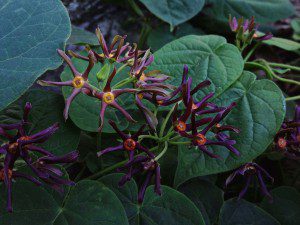Posts by VNPS Communications
Matelea obliqua: Climbing Milkweed
Did you know that monarchs are not the only caterpillars that feed exclusively on milkweeds? From our guest blogger and photographer, Fritz Flohr Reynolds: Matelea obliqua, climbing or oblique milkweed, is a perennial herbaceous vine native to the eastern United States. Its range includes Washington D.C., as well as parts of Maryland and Virginia, including…
Read MoreNative Plants for Pollinators: An App
It’s National Pollinator Week, and now we can all Bee smart, because there’s an app for that! Yes, really. The next time you are shopping for plants, you will be able have help in figuring out the plants you can use in your very own garden to help pollinators the most. Available on both Android…
Read MoreVNPS Writes Proclamation for Pollinator Week
The VNPS takes an active role in legislative issues, keeping members informed of important ideas and laws that are being considered by lawmakers in Virginia. We also coordinate with other groups to put forward actions that work toward our goal of conservation. Recently the Pollinator Partnership put out a call for national recognition of a…
Read MoreThree Cheers for Ninebark: Physocarpus opulifolius
Ninebark, a native shrub with an intriguing name, is a plant worth getting to know. Its many attributes include an abundant flowering habit which is currently being exhibited in Virginia. The city of Alexandria put some native plantings in new park at the base of the Woodrow Wilson Bridge three springs ago. Last week a…
Read MoreDr. Tallamy’s Reply to “What’s all the fuss about native plants?”
Our blog this week is a letter written by Dr. Doug Tallamy, Professor and Chair of the Department of Entomology and Wildlife Ecology at the University of Delaware, and author of Bringing Nature Home. Written to the New York Times last week: Subject: Misinterpretation/factual errors in article on Gardening for Climate Change Dear Editor: I am…
Read MoreVNPS: What Do We DO?
“A plant society? What is that? What kinds of things do you do?,” asked a somewhat incredulous young man visiting a VNPS table recently. One of the things we do, of course, is to have educational display tables at all kinds of events, where people can ask questions like this one! To the inquirer, I…
Read MoreThe Plantwhacker Wins!
For years, while mercilessly killing non-native invasive plants at Long Branch Nature Center, I have harbored the admitted fantasy that the invasives’ removal will magically reveal some cool, unexpected native plants. And to be sure, I have seen some nice native plants and have been able to track how many of them respond positively to…
Read MoreNatives Are Glamorous Plants!
“Natives are the most glamorous things in the world,” says Randee Wilson, “It really gnaws on me to hear people refer to natives as weedy.” Randee shared his opinion recently with a group of people who are working on a native plant marketing partnership. There may be some non-natives that are beautiful, too,” Randee said, …
Read MoreSpring Ephemerals: Catch ’em While You Can
April is perhaps the very best month in Virginia to catch a sight of these extraordinary flowers that grace the landscape for such a brief time. To be ephemeral is to be short-lived, fleeting, brief. Bluebells, merrybells, Dutchman’s breeches, squirrel corn, trilliums, lady slipper orchids, bloodroot, hepatica, trout lily, twinleaf and toothwort; even their names…
Read MoreThe Flora of Virginia Project Gets Noticed!
The Flora of Virginia Project continues its upward trajectory with recent coverage by both press and radio of the opening of its truly grand exhibition in the Library of Virginia in March. Members of the Virginia Native Plant Society can take justifiable pride in the fact that we generously helped to fund first the book,…
Read More

